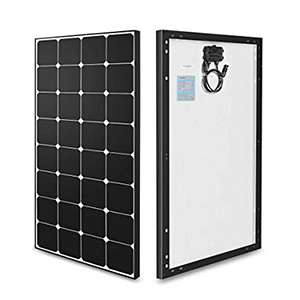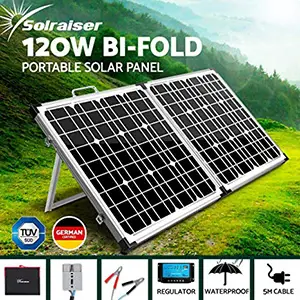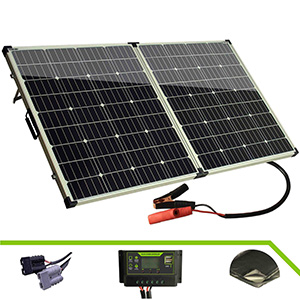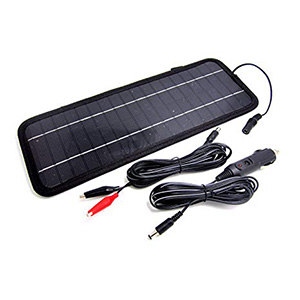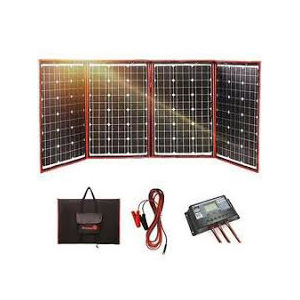Choosing the Best Camping Solar Panels
Camping can be fun: we could list 15 reasons why you should regularly go camping. However, while camping has tons of benefits, it can be a stressful experience if you make no plans to handle your power needs while you are out there in the wilderness alone or with friends.
In the connected world we live in, a power bank is never enough to provide for all your power needs once you go off-grid.
Generators solve the problem of power. But they come with issues of their own. You don’t want to be the one disrupting the peace and quiet of the woods or your camping site (learn how to make your generator quiet). Throw in the environmental damage they bring along, and you’ll understand why it really shouldn’t be an option for powering a low-key camping trip.
A couple of years ago, most solar panels were unwieldy bulky panels. They were extremely difficult to install, and it was always a problem carrying them around.
In recent times, powered by Moore’s Law, camping solar panels have become portable, foldable and more efficient. Driven by this, more and more campers have ditched the obnoxious generators for easy to install solar panels that solve most or all of their power needs while off-grid.
Why Solar Panels?
Besides unlimited and clean energy, the power provided by solar panels is one of the most beneficial forms of energy that humans have been able to harness. It offers many benefits such as the following:
- It’s guaranteed natural and renewable free energy once you have adequate sunlight and the appropriate equipment.
- Solar panels, unlike generators, can be used without restrictions at every campsite as long as they are installed properly and are safe.
- Solar panels allow you to generate power at any location no matter how remote it might be – as long as you set it out to charge in daylight.
- Having solar panels means you have extra cash to spend. Most places charge outrageous fees to campers who need tech-charging services.
- No need to carry a noisy generator around and additional fuel
How to Choose the Best Portable 12V Solar Panel
Deciding on which solar panels to buy can be a tricky task, especially if you don’t know what you are looking for. Here are a few pointers you must consider to ensure you pick the solar panel that is perfect for your off-grid needs.
What appliances will the solar panel be used for?
Are you going to need to power just the lights and charge your phones? Or you plan to keep the drinks cold? Maybe pump up a camping mattress? Your power needs define the size of the 12V solar panel you will need. If you need to use a camping fridge, you probably need a 12V solar panel with a higher energy output or consider a 12v to 240v inverter. That way you can power the fridge comfortably.
How long will you be out camping?
Are you gone for a week or more? You need to calculate the wattage you need for all your gadgets daily and then decide which devices you will connect to the solar panel.
Computing your daily usage also helps you pick the right battery for the solar panel. Its total capacity should be higher than that of your daily usage. Asides from ensuring you have enough power for your devices, you don’t want to drain your battery every single time. It reduces its lifespan.
Lastly, pick a solar panel that exceeds your daily computed power usage. That way, you have a fully charged battery daily.
What’s the panel type?
The quality and performance of a solar panel is heavily affected by the photovoltaic cell used in its production. There are two major types of photovoltaic cells – polycrystalline and monocrystalline.
- Polycrystalline cells – These were the first form of solar panels developed. Built to be cost effective, manufacturers used lower grade silicone materials, while still engineering it to produce sufficient power for off-grid usage.
- Monocrystalline cells – With the availability of higher grade silicone at much affordable rates, manufacturers could now produce better solar panels. Monocrystalline cells have a larger surface area while allowing for smaller sized solar panels than previously manufactured. This helped reduce the cost, size and portability of solar panels without reducing power output. They are also more durable and last longer than their polycrystalline counterparts.
What else do you need for the solar panels?
Besides the batteries, you need to get an inverter or solar regulator with quality cabling to your solar panels. Power from the solar panels usually fluctuates, and can damage your batteries if not regulated. The inverter transfers the appropriate voltage to your battery and should be able to float the charge once your battery is full.
Inverters are considered the brains of an off-grid system. They invert the direct current (DC) that the solar panel produces to alternating current (AC), which is what most appliances use.
Final Thoughts: Which Solar Panel Should You Get?
By now, you should be some sort of expert at evaluating the best 12V solar panel for your next camping trip.
My perspective, and it doesn’t have to count – ensure you get monocrystalline panels. They have higher efficiency levels and are smaller in size. They also handle lower sunlight levels much better and are only marginally more expensive than polycrystalline cells.
But most importantly, remember that you don’t have to give up life’s little luxuries when camping – you can still keep your phone fully charged and drink your beer ice-cold without upsetting the environment with your generator’s fumes and noise.
Find loads more camping tips, tricks and products here at Bright Camping.


